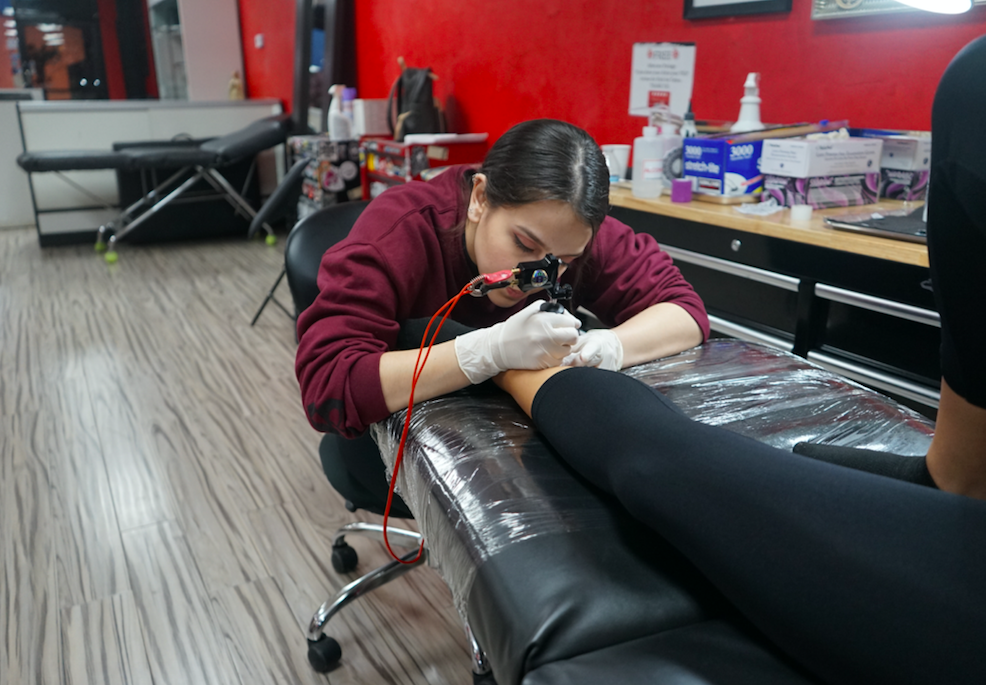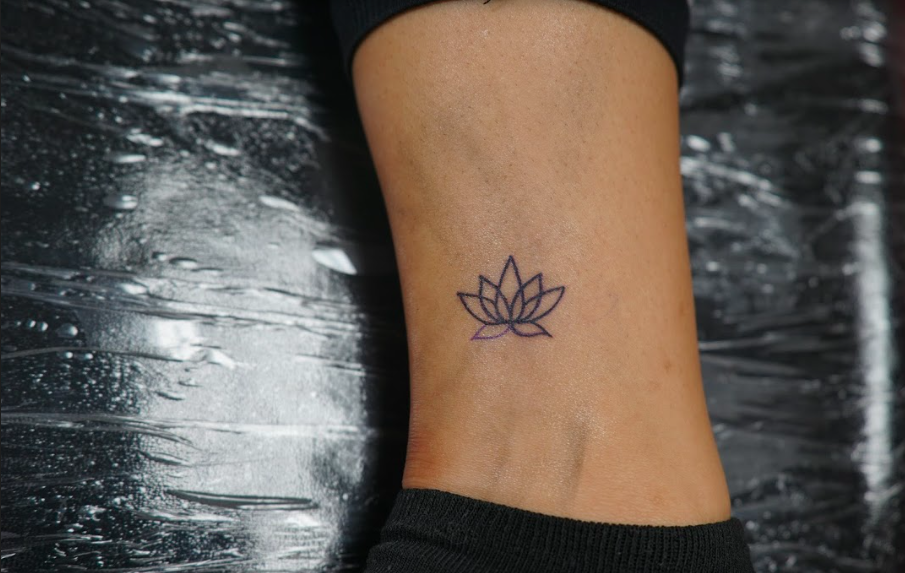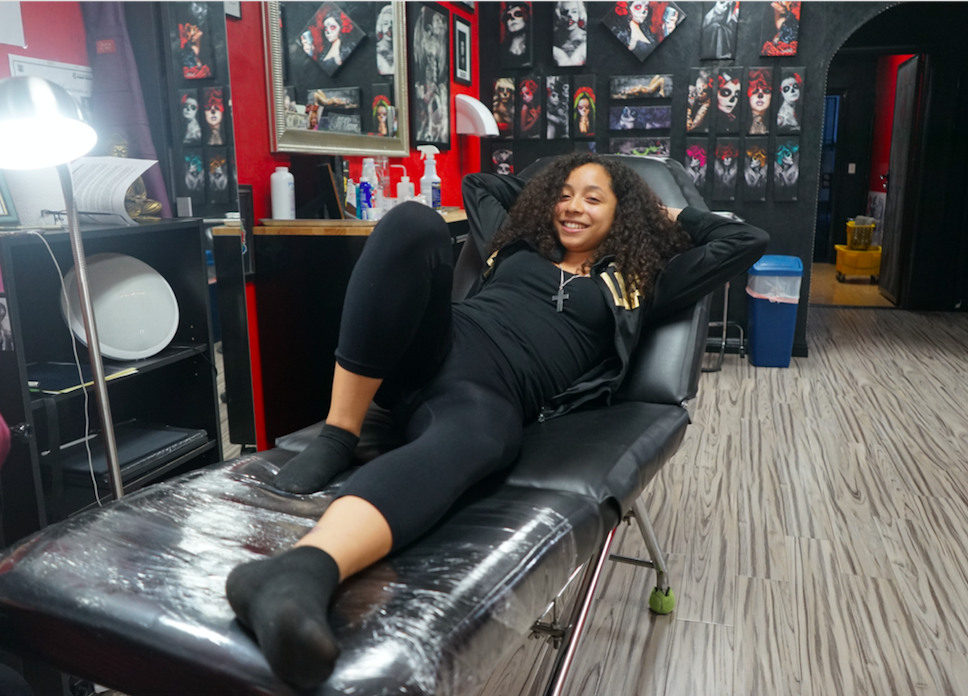
First-year sports administration major Nina Harris had a moral dilemma: to follow her desires or her father’s’ wishes.
If she choose to express her creativity by getting a tattoo, she would be going against her father’s Old Testament preachings. Harris grew up in the Paradise Missionary Baptist Church and her father instilled a strong sense of faith in her family.
“My father is also a strong man of God so he has always been against the idea of tattoos and piercings,” Harris said. “He believes that our body is a temple that serves as the foundation. He was only OK with ear piercings if they were on girls. When it came to tattoos, he scared me when I was younger by speaking negatively about them.”
For a month, Harris debated how additional tattoos and piercings would affect her faith and her father.
She decided on a lotus flower placed on the inside of her ankle and also got her third ear piercing on the same trip.
“It’s for me,” Harris said. “The tattoo, I can always look down and glance at it, and think about my best friend when I miss home, and I’ve always loved ear piercings, so I plan on continuing to add. I can always take them out for work when the time permits.”
Harris is not alone in weighing Old Testament prohibitions against tattoos and piercings and general Christian distaste toward body art. But for most Pepperdine students, career constraints weigh heavier, and most students get tattoos and piercings to express themselves or for symbolic reasons.
Religious implications
One Old Testament prohibition against piercings and tattoos hails from Leviticus 19:28: “You shall not make any cuts in your body for the dead nor make any tattoo marks on yourselves.”
“I think the Old Testament has many historical lessons in it, many which we ignore now because of political correctness,” Avesta Carrara, office manager at Alumni Affairs, said. “The Bible is a history book, not just a religious book.”
Carrara dislikes tattoos for other reasons.
“I am a purist about the human form,” Carrara said. “I am old enough to know that the buff bodies diminish to be replaced by aging and wrinkling skin which makes tattoos look terrible as folks age.”
However, some argue tattoos are “accessories like jewelery,” senior economics major Kendall Dunn said.

Career as a factor
Students said they heavily consider future employment when considering tattoos and piercings, including weighing their preferred career field and whether they will be a public face for a company or organization.
“Some employers are open to them to a certain degree,” Asa Bailey, senior, sports medicine major student worker at the Career Center, said. “However, I think that it depends on the job setting so we recommend that students cover them up during the interview to avoid speculation.”
A person’s field of work may determine whether tattoos and piercings would be accepted.
“Being the face of the company would require a clean cut look, but working in sports for example, is a more open, casual setting that’s receptive to body modification,” Harris said.
For the business world, this can mean that placement is crucial. Pew Research Center indicates that 70 percent of Americans who have a tattoo got one in a hidden spot from the public eye.
Chad Quinones, assistant director of Alumni Relations, said he strategically placed his tattoo on his calf so that it wouldn’t constantly show at work.
“I waited a long time to get my first tattoo,” Quinones said. “I wanted to make sure it was something I knew I’d love forever in a spot that I could see it. It wasn’t for anyone else but me.”

Elijah Lee, a first-year organizational communication major, thinks about future employment when it comes to his potential tattoos and piercings.
“If I’m aiming high, placement is strategic,” Lee said. “I wouldn’t get a tattoo that’s too visible if I intend to be in the business setting.”
Parental scrutiny is a factor for some students as well, but the desire to express oneself usually wins out.
“My mom isn’t very receptive to piercing or tattoos,” senior economics major James Cowart said. “I anticipated finally get my ears pierced. I also got a tattoo on my shoulder, and no, I did not tell mom. She found out and wasn’t excited about it, but she also had to realize that it’s my body, and I will chose to express freely however I may please. Plus the placement was thought through. I work in Information Technology so my shoulder tattoo is high enough that it will never show at work.”
Symbolism as a drive
Students say that they are taking into account their future employment, but also said that their piercings and tattoos represent value and meaning to who they are.
“Tattoos and piercing should be respected because it’s a form of art and expression,” Lee said.
Tattoos and piercings have taken on deeper meaning to some, and they often have powerful stories behind them.
“My inspiration for my tattoo was for someone who I loved very much who passed away when I was 16,” Humanities Professor Lauren Kilroy-Ewbank said. “It represents paying my respect and commemorating him.”
While others won’t always know the meaning behind a tattoo or piercing, which can be deterring, Kilroy-Ewbank said only the individual getting the body art needs to know the symbolic significance.
“My parents weren’t happy about it,” Kilroy-Ewbank said. “They are from a generation that sees them as more taboo, but they understand the meaning behind it and why I got it. As for my nose piercing, I fell on a door blade when I was 2 and had 40 stitches in my nose. It used to be more visible and as a young person, I was self conscious about it. So I got the nose piercing over the scar because I felt like I was taking some power back of something very upsetting to me and it made me feel more confident.”
Society has become more receptive to tattoos and piercings, students said, making it easier to express oneself through body art.
“The most important thing I have learned is that a tattoo or piercing does not change who that person is,” Harris said. “It does not make them a bad person, a rebel, or incapable of anything. In fact, I have learned to see them as a symbol of creativity, confidence, strength and self-love.”
Rose Cowart completed this story under the supervision of Dr. Christina Littlefield in Jour 241 in spring 2017.



